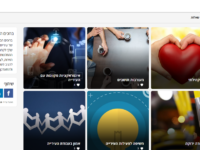MedeINN arose from the need to innovate in the government sector, in a city that had been developing its innovation capabilities in all other sectors. For this reason, and under Innovative State premise, we seek to connect the Mayor's Office of Medellín´s challenges with entrepreneurs and researchers capacities. This has been achieved after a redesign of a Public Procurement for Innovation methodology, which enables Open Innovation in the government sector.
Innovation Tag: Digital and Technology Transformation
The Environment Agency has a responsibility to protect communities from flood and coastal risks. In the past, the agency has struggled to scale their public engagement and reach their diverse audiences, while also retaining a local relevance. Hello Lamp Post was brought on to provide an interactive, live 24/7 conversational channel to educate and inform the public on flood safety, in high-risk locations around the South West of England and Newcastle.
Case Study
‘Con Vos’ Network: Digitalization for Effective Governance. Community Markets to Improve Access…

When applying for state aid or other services without the means or knowledge to do it online due to the digital gap, it usually takes a day or waiting in queues and filling out paperwork. Communities have thought and offered a grassroot solution: store owners helping their peers to get online procedures done in their business, in exchange for a small fee. It is a simple innovation, yet effective when it comes to decentralize public services, foster digital inclusion, and strengthen local markets
Strategic planning has turned into bureaucracy circus, without really moving the needle. The City of Ashdod has pioneered a new strategic planning model, in collaboration with Insights.Us. The new methodology enables city leadership to define key measurable outcomes, harnessing cross-silos action plans. The digital platform was designed to celebrate success stories, and connect the community, allowing an inclusive whole-of-city approach.
The hard-fought gains of democratization have come under attack in many countries. To reverse this trend, policymakers and civil society need new tools to navigate sophisticated forms of democratic erosion. We combine recent advances in machine learning with massive webscraping to produce high-frequency data and forecasts predicting where democratic backsliding will occur and the specific forms it will take. We equip pro-democracy forces with advanced warning to guide more strategic responses.
With the Quality Tools an organisation can evaluate, monitor and compare the quality and use of its services within and between organisations. The tools include a Self-assessment, Customer Feedback and Utilisation Rate Measurement tool and are free of charge. The tools were developed primarily for public sector organisations to help them develop customer-oriented digital services and improve knowledge-based management. On a national level the tools provide data on the state of digitalisation.
We live in an infodemic context. A lot of data doesn't mean good data. This brings to question the information sources and the data itself. Decision-makers don’t understand citizens’ needs and act based on uninformed decisions, and citizens feel neglected. This generates a systemic lack of trust. Citibeats' ethical AI makes helps governments interpret the huge quantity of data exchanged every day by citizens in real time, understand their needs, and make faster and better-informed decisions.
Case Study
Personalized feedback service for national qualification test result – Digital Mentor Service…

"Why did I fail? How should I develop my career?" To address such concerns, we developed the Digital Mentor Service of National Qualification. It leverages massive data on national qualification tests to identify each individual's weaknesses and why they fail. It also provides personalized information by matching examination history with jobs and training offered by government agencies. Supporting test takers from skills assessment and development to job placement.
The Startup GOV.BR Program aims to accelerate strategic digital projects at federal government in an unprecedented and innovative way. By providing technological tools, allocating professionals and assisting them to adopt agile methodologies, it supports a 30-crosscutting-project portfolio with several federal agencies. The initiative has promoted a paradigm shift in the management of public digital solutions, incentivizing agility, resilience and value generation for citizens and general users.
Shanghai Data Exchange (SDE) has initiated a new business racing track of data factor market. SDE has independently developed a data trading system named niDts Intelligent Data Trading System, which provides efficient, convenient, transparent and secure data trading services, enabling the market development of data as a production factor, and fueling the digital transformation of economy, life and governance.





